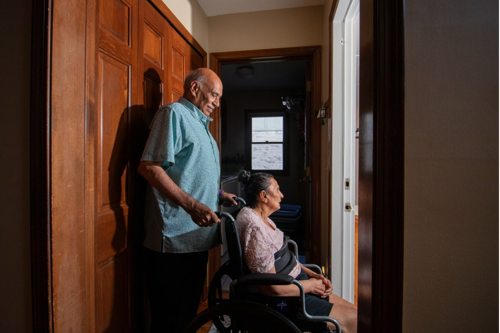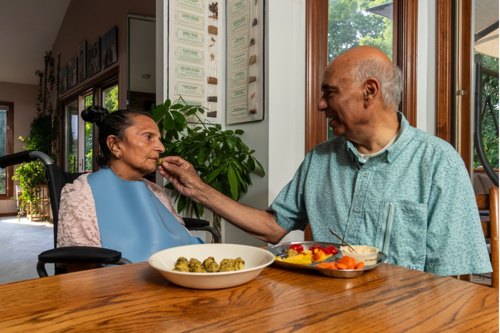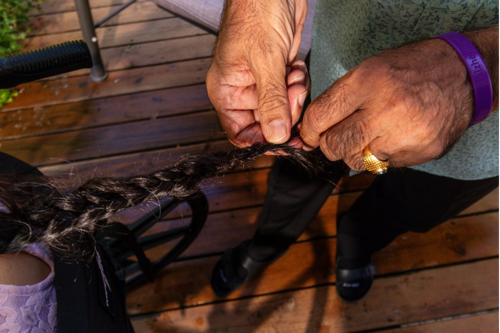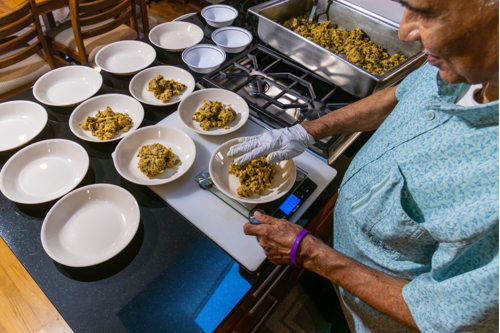September 11, 2025, 4:30 pm, 78F (26C), Bright sunny day
Writer Erica Hobbs of the New York & Michigan Solutions Journalism Collaborative contacted me in August 2023 to interview me by phone. Her focus was on male caregivers and the challenges they face.
A professional photographer visited our house a few days later for photos to accompany the article.
I heard nothing further from Erica, but a recent internet search revealed this in-depth and thoughtful article about my experience as a male caregiver for Sumi, which was published on December 18, 2024.
The New York & Michigan Solutions Journalism Collaborative (NYMI SOJO) is news, academic and community organizations pooling their resources to cover chronic problems in our communities with a solutions-focused lens.

Caring for his wife led to him build a support group for men like him
by Erica Hobbs | Dec 18, 2024 | Caregiving

Mehta, 77, guides his wife Sumi’s wheelchair at their Michigan home. In 2013, at age 59, Sumi was diagnosed with early-onset Alzheimer’s disease, which has progressively impaired her physical and mental capabilities.
(Photo by Alejandro Ugalde Sandoval)
For Kanu “KC” Mehta and his wife, Sumi, every day follows a routine. At 10 a.m., Kanu wakes his wife. He bathes and dresses her and readies her for the day. Breakfast follows at around 11, a plate of cooked vegetables and a fruit smoothie. From noon to 6 p.m., Sumi’s sitting time, includes lunch at 2 — usually a plate of hummus, cut vegetables and cheese — and another plate of cooked vegetables at 5:30 p.m. for dinner. Sumi is returned to bed from 6 to 7 p.m. for a rest before going back to her chair until bedtime at 10.
In 2013, at age 59, Sumi was diagnosed with early-onset Alzheimer’s disease, which has progressively impaired her physical and mental capabilities to where she is no longer able to walk or speak.
Her husband, 77, has been by her side nearly around the clock since. He quit his consulting job in 2015 to take care of his wife full time.
While caregiving often falls to women, Kanu Mehta is one of a growing number of male caregivers throughout the United States. According to a report from the AARP and the National Alliance for Caregiving, 40 percent of caregivers are male, up from 34 percent in 2009.
As Sumi’s full-time caregiver, Mehta from Rochester Hills, Michigan, has participated in several support groups. They include those at various stages of caregiving who share stories that offer an understandable experience.
“When you go into the support group, you think you are the only one having these thoughts and feelings,” he said. “But when others share their thoughts and feelings, you feel that you are not alone in this journey; there are other people, and you support each other.”

Kanu Mehta, 77, feeds his wife Sumi, 70, at their home in Michigan. Since her Alzheimer’s diagnosis in 2013, Sumi’s motor skills have progressively deteriorated. Now in the late stage of the disease, she requires full assistance with daily tasks like eating, showering, dressing, and mobility. (Photo by Alejandro Ugalde Sandoval)
Mehta created in May 2023 an unofficial support group with other caregivers with whom he’s bonded. It started with four or five going out for meals, but when that proved costly, Mehta offered to host them in his home to treat them to homemade Indian cooking.
As he offered them masala chai, spiced omelets and other dishes from his home country, the caregivers began asking questions. Mehta offered them free Indian cooking classes he dubbed Cooking with Caregivers.
“Many people go through life looking for a purpose in life … but I’m not struggling with that question now.”
KANU MEHTA, SPOUSAL CAREGIVER
That sense of fulfillment in supporting his fellow caregivers echoes how he feels caring for his wife. As an engineer, Mehta said he is usually a logical, linear, solution-oriented thinker. But caring for his wife has activated other parts of his brain.
The work isn’t easy. Like their female counterparts, male caregivers must often sacrifice their professional and personal lives and struggle with social isolation, guilt, mental fatigue and depression.
However, male caregivers face a different set of challenges. Caregiving often requires daily cooking, cleaning and managing a household—work traditionally done by women. Mehta says many men don’t have these skills, even if they want to be caregivers.
“I have two or three good friends that cannot even make tea or…scrambled eggs or something [like that],” he said, “Some people have never turned on the stove.”
Male caregivers also may often be uncomfortable with high-touch, personal care. According to the AARP Public Policy Institute, 54 percent of male family caregivers in the U.S. said they found it difficult to help recipients with their personal, intimate care.
Another common challenge for men is an inability to express and cope with the complicated feelings that come with being a caregiver. Where women may find it easy to open up to friends, Mehta said it’s not often the case for men. This echoes studies that show men tend to have weak support networks and are less likely to seek out help coping with the emotional burden.
“Females tend to be more communicative, more social, in a way, so if something were to happen to me, maybe my wife would have a good connection with other females,” Mehta said. “As a man [speaking to] a man, we don’t talk much, or we always talk very to the point.”
He recalls the emotional distress in the initial years of caregiving. He said when they first learned of his wife’s diagnosis, he went through the grieving stages of shock, anger, reflection and acceptance. Denial was initially his prominent emotion, downplaying the severity of the disease to manageable mild cognitive impairment. But Mehta was triggered when his wife got lost on her way to a friend’s house and was missing for five hours. He knew then they needed to see a doctor.
“I have two or three good friends that cannot even make tea or…scrambled eggs or something [like that],” he said. “Some people have never turned on the stove.”
Since then, he’s had to watch his wife slowly lose her verbal and physical skills. Until about two years ago, Sumi could walk, and her daily routine incorporated physical exercise, which is no longer possible.

KC Mehta braids his wife’s hair in their home.
Last December, Mehta welcomed assistance from hospice, which has given him access to additional support resources and has helped him to imagine life after his wife dies.
Despite the challenges, Mehta has long been in the acceptance stage, which he attributes to self-care and time.
“One thing I realized, I do have to have my own life in a way, while she’s here, and I’m taking care of her,” he said, “and I’m doing as much as I can.”
Mehta now has a team of caregivers who come weekdays, and he still takes advantage of support groups and activities. One of his favorites is taking art classes at the Birmingham Bloomfield Art Center, which offers free courses to caregivers.
For six years, he’s learned to make watercolor paintings, ceramics, mandalas, and other art, which now cover his den. The classes often include journaling to help caregivers process complex emotions. He also enjoys the picturesque drive through the campus in Bloomfield Hills and connecting with other caregivers.
“While doing the artwork, you’re totally immersed in it. You just forget about everything,” Mehta said. “You don’t even know you are a caregiver, or you have a wife at home, or something happened in your life. It’s very relaxing.”
Still, Mehta has found a sense of fulfillment in caring for his wife, which has activated other parts of his brain.

Mehta created an unofficial support group that started with four or five caregivers going out to eat, but when that proved costly, he hosted them in his home to treat them to homemade Indian cooking and later started a free Indian cooking class he dubbed Cooking with Caregivers. (Photo by Alejandro Ugalde Sandoval)
“She gives me clarity, she gives me focus, and she gives me purpose,” he said. “Many people go through life looking for a purpose in life … but I’m not struggling with that question now. Maybe that type of mindfulness or equanimity gives me that more balanced mindset.”
In addition to joining a support group, Mehta recommends caregivers find achievable, solution-oriented tasks, which helps to gain a sense of achievement and control in an otherwise uncontrollable situation.
He purchased personal safety equipment from a sporting goods store when his wife was at risk of falling during walks.
“You don’t get victories in this disease, but when I fix something for her safety, like putting safety gear on her…seeing her walk and fall, but [still being] safe, that’s a victory,” he said. “You did something for her well-being.”
Mehta also said it’s crucial for caregivers — especially men — to find a way to express their emotions.
“Journal, write a diary, do something to express your feelings, don’t bottle up, don’t brood inside, let your emotions be open,” he said. “As a man, I’ve cried; there’s nothing wrong in crying.”
Please click on the link below to read the same article on NY & MI SOJO website:
https://nymisojo.com/2024/12/caring-for-his-wife-led-to-him-build-a-support-group-for-men-like-him/
